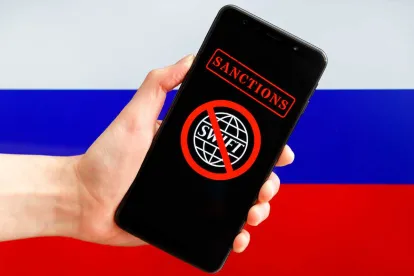On May 8, 2022 (aka Mother’s Day), the Biden Administration announced yet another series of export controls and sanctions measures intended to ratchet up the costs on Russia’s economy and limit its ability to continue its war in Ukraine.
-
US Department of Commerce, Bureau of Industry and Security (“BIS”) added still more export license requirements on HTS codes going to Russia;
-
US Department of the Treasury, Office of Foreign Assets Control (“OFAC”) banned exports of accounting, trust and corporate formation, and management consulting services by US persons to Russia, and established the threat of blocking sanctions for non-US persons operating in these sectors;
-
OFAC designated Russian television networks, banks and banking officials, and a defense-related company; and
-
US Department of State designated Russian maritime interests and imposed human rights-related visa restrictions on Russian and Belarusian individuals.
Commerce Expands List of Items Requiring Export License to Russia to Long List of Industrial Equipment and Materials
Effective May 9, 2022, BIS imposed export licensing requirements on a very long list of industrial equipment and materials in what it is calling the “Russia Industry Sector Sanctions Expansion” rule.
The rule vastly expands the list of HTS/Schedule B numbers in Supplement 4 to Part 746: it adds 205 HTS codes at the 6-digit level and 478 corresponding 10-digit Schedule B numbers to better align with the European Union’s controls. The rule also clarifies that only the items identified in the HTS Description column of the revised supplement are subject to the new licensing requirement. BIS notes that “[t]he other three columns – HTS Code, Schedule B, and Schedule B Description – are intended to assist exporters with their AES filing responsibilities. If an item is classified under one of these HTS Codes or Schedule B numbers, but it is not described by the relevant entry in the HTS Description column, it is not subject to the license requirement…” So the HTS written description is dispositive.
The new rule includes a savings clause: shipments of items that are now no longer eligible for license exceptions or no longer fall under the category No License Required (NLR) “that were en route aboard a carrier to a port of export, re-export, or transfer (in-country)” on May 9, 2022, may proceed to their destination under previous eligibility criteria if the shipment was made pursuant to “actual orders for export, re-export, or transfer (in-country) to or within a foreign destination.”
Who needs to go back and check? We have provided the listing of affected HTS codes so that companies can see if the HTS description column captures their exports.
OFAC and State Department Take Sanctions Actions
On Sunday, May 8, OFAC and State took further significant sanctions actions against Russia, including two new “Determinations” addressing a new set of prohibited services and threatened sectors; the designation/blocking of 33 individuals, 22 entities, and 69 vessels; three new and one amended General Licenses; and eight new Frequently Asked Questions (“FAQs”). These actions appeared timed to coincide with Russia’s World War II Victory Day celebrations and President Putin’s tying that celebration to the current invasion of Ukraine (they also coincided with Mother’s Day in the United States and many other countries, which certainly was no fun for the many mothers at State and Treasury).
OFAC prohibition on accounting, trust and corporate formation, and management consulting services to persons in Russia.
The prohibition:
OFAC issued a Determination Pursuant to Section 1(a)(ii) of Executive Order 14071, which prohibits, beginning on June 7, 2022, the “exportation, reexportation, sale, or supply, directly or indirectly, from the United States, or by a United States person, wherever located, of accounting, trust and corporate formation, or management consulting services to any person located in the Russian Federation.” Specifically excluded from this new prohibition are services:
-
provided to an entity that is directly or indirectly owned or controlled by a US person; or
-
connected to a wind down of, or divestiture from, an entity that is not directly or indirectly owned or controlled by a citizen or national of the Russian Federation or an entity organized under the laws of the Russian Federation.
General licenses:
OFAC concurrently issued two general licenses that further delay the effective date of this new prohibition for many transactions:
-
New General License 34 authorizes through the end of the day in Washington on July 6, 2022, transactions ordinarily incident and necessary to the wind down of any of the transactions prohibited by this Determination, provided they are not prohibited by other sanctions provisions (e.g., transactions involving blocked persons). While there is no stated requirement in this general license that the wind down transactions must be related to a pre-May 8, 2022, contract or other agreement, engaging in completely new business under the guise of “wind down” is not likely to be tolerated by OFAC. Accordingly, in order to stay safe, any wind-down activity should be solidly anchored to some sort of agreement or activity that was in existence or ongoing on or before May 8, 2022.
-
New General License 35 authorizes through the end of the day in Washington on August 19, 2022, transactions ordinarily incident and necessary to the credit rating and auditing services prohibited by this Determination, provided they are not prohibited by other sanctions provisions (e.g., transactions involving blocked persons). This is not a wind down license and therefore authorizes wholly new business, though it must completely end (including receipt of all related payments) by the termination date. FAQ 1035 explains that:
-
credit rating services means services related to assessments of a borrower’s ability to meet financial commitments, including analysis of general creditworthiness or with respect to a specific debt or financial obligation; and
-
auditing services means examination or inspection of business records by an auditor, including checking and verifying accounts, statements, or other representation of the financial position or regulatory compliance of the auditee.
-
Interpretation of terms:
FAQ 1034 defines “accounting, trust and corporate formation, and management consulting services” for purposes of this new prohibition as follows:
-
Accounting services include services related to the measurement, processing, and transfer of financial data about economic entities.
-
Trust and corporate formation services include:
-
services related to assisting persons in forming or structuring legal persons, such as trusts and corporations;
-
acting or arranging for other persons to act as directors, secretaries, administrative trustees, trust fiduciaries, registered agents, or nominee shareholders of legal persons;
-
providing a registered office, business address, correspondence address, or administrative address for legal persons; and
-
providing administrative services for trusts.
-
-
Management consulting services include services related to:
-
strategic advice;
-
organizational and systems planning, evaluation, and selection;
-
marketing objectives and policies;
-
mergers, acquisitions, and organizational structure;
-
staff augmentation and human resources policies and practices; or
-
brand management.
-
-
Legal services have been the subject of some discussion following a White House background press call in which the spokesperson said that the decision was to hold off on prohibiting legal services related to the ability to “seek due process through a US lawyer,” and follow-on press reporting suggesting this means all legal services are excepted from this new prohibition. We suspect this may be an area where OFAC may wish to offer additional clarification to the bar given the very broad definitions of the services that are prohibited (e.g. management consulting services includes “services related to strategic advice … and brand management.”)
Threat of Blocking Sanctions for Operating in Russia’s Accounting, Trust and Corporate Formation Services, or Management Consulting Sectors
OFAC also issued a Determination Pursuant to Section 1(a)(i) of Executive Order 14024 identifying the “accounting, trust and corporate formation services, and management consulting sectors of the Russian Federation economy” as sectors targeted under Section 1(a)(i) of EO 14024, which means that any persons determined by Treasury or State to be operating in one of those sectors can be designated for blocking sanctions and placed on the SDN List. These sectors join the financial services, aerospace, electronics, and marine sectors, which were similarly identified earlier this year under Section 1(a)(i) of EO 14014, as well as the defense and related materiel, energy, and financial (yes, that may be somewhat redundant) sectors, which were identified for similar risk of targeted sanctions under EO 13662. With this new determination, the US Government is signaling that these new sectors of the Russian economy are currently in the sanctions’ cross-hairs. No concurrent designations were made under this new authority, however, which suggests that OFAC will be focusing on any entities that rush in to fill the void left by US firms’ exit, and such entities will do so at significant risk of landing on the SDN List.
The definitions of these sectors are provided in FAQ 1038, which tracks with only a few non-substantive grammatical shifts the same definitions provided for the other Directive in FAQ 1034 discussed above.
A Couple Notes on “Determinations” Versus “Directives” and OFAC’s Delegated Authority
It is worth noting briefly that the new prohibition described above was placed in a “Determination” and not, as has been done in the past, a “Directive.” There is nothing historically special about this terminology, but Treasury has in the relatively recent past used Directives to set out new prohibitions and used Determinations only to identify new sectors of a country’s economy in which participants could henceforth be targeted for blocking sanctions. It seems that this distinction has fallen by the wayside. While a little confusing, there do not appear to be any significant legal ramifications here to worry about, and it will be interesting to see if this was a one-off occurrence or if Treasury may follow any particular pattern with respect to Determinations versus Directives in the future.
Also worth noting is that Treasury issued both of these Determinations through OFAC, and not through the Secretary of the Treasury. OFAC generally has delegated authority from the Secretary of the Treasury to take all actions the Secretary can take under the various sanctions authorities Treasury implements (these delegations usually are contained in the relevant sanctions regulations), but historically something as momentous as a new Directive or Determination is issued by the Secretary of the Treasury, who is a political appointee, and not the Director of OFAC, who is not. Pushing this authority down to the OFAC Director level should not cause much concern, because the OFAC Director is always a highly knowledgeable career servant who does not take any action of this size without approval from the Secretary and, quite often, the President. But others may express concern about a lack of political accountability of OFAC’s Director for such significant actions.
OFAC Designation/Blocking of Russian Television Networks, Banks and Banking Officials, and a Defense-Related Company
OFAC designated/blocked the following:
-
Three of Russia’s State-owned television networks:
-
Joint Stock Company Channel One Russia
-
Television Station Russia-1
-
Joint Stock Company NTV Broadcasting Company
-
General License 25 (now 25A), which authorizes transactions related to telecommunications and certain Internet-based communications, was amended to exclude transactions with any of these three television networks. New FAQ 1040 states, without much further substantive explanation, this exclusion.
-
New General License 33 authorizes through the end of the day in Washington on June 6, 2022, transactions ordinarily incident and necessary to certain wind down of operations, contracts, or other agreements involving one or more of these three networks or their blocked subsidiaries provided the operations, contracts, or other agreements were in effect prior to May 8, 2022, and that all payments to a blocked person be paid into a blocked account in the United States (and further provided that no other sanctions provisions are violated (e.g., transactions with other blocked persons)).
-
-
Eight current or former members of the Executive Board of already-blocked Sberbank.
-
25 new members of the Board of Directors of Gazprombank, which is not itself blocked (at least not yet), but which is subject to new debt and equity restrictions under Directive 3 (EO 14024).
-
Joint Stock Company Moscow Industrial Bank (“MIB”) and 10 of its subsidiaries. MIB is a Russian state-owned bank that provides a wide range of commercial banking services.
FAQ 1039 clarifies that the existing general authorization that covers certain agricultural exports (General License 6A) applies and authorizes those transactions with MIB subsidiaries that are involved in the agricultural sector.
- Limited Liability Company Promtekhnologiya (“Promtekhnologiya”), a private defense company that produces ORSIS brand rifles and supplies Russia’s military and intelligence services.
These blocking actions also block the property of all entities that are directly or indirectly owned 50 percent or more, whether individually or in the aggregate, by one or more of the above-listed persons.
Department of State Designation/Blockings of Russian Maritime Interests and Visa Constraints
The Department of State (“State”) designated/blocked eight large Russian maritime entities (one of which was already blocked under the Crimea-related sanctions) and identified 69 vessels that are now blocked property due to these new designations. OFAC concurrently placed the entities and vessels on its Specially Designated Nationals and Blocked Persons (“SDN”) List. The list of entities and vessels, and all of their identifying information (e.g., addresses, IMO #s, etc.), can be found both in State’s press release and OFAC’s sanctions announcement, but since OFAC’s announcement also contains OFAC’s other actions described above, you may find it easier to look at State’s press release. In its press release, State explained that the actions targeted the Russian Ministry of Defense’s shipping company and private Russian maritime shipping companies that transport weapons and other military equipment for the Government of the Russian Federation (“GoR”) as well as one maritime engineering company that works with the GoR and Russian state-owned entities, serving as “a warning to private Russian companies that those who support Putin’s war machine risk severe costs.” These blocking actions also block the property of all entities that are directly or indirectly owned 50 percent or more, whether individually or in the aggregate, by one or more of the above-listed persons.
The State Department concurrently announced a series of visa actions against certain Russian and Belarusian persons “to promote individual accountability for human rights abuses.” The new State visa restrictions include:
-
A new visa restriction policy under Section 212(a)(3)(C) of the Immigration and Nationality Act that applies to both Russian military officials and “Russia-backed or Russia-installed purported authorities” believed to have “been involved in human rights abuses, violations of international humanitarian law, or public corruption in Ukraine, including in the so-called ‘Donetsk People’s Republic’ or ‘Luhansk People’s Republic.’” This restriction will also apply to family members who fall under the policy.
-
Visa restrictions on 2,596 members of the Russian military and 13 Belarusian military officials “who are believed to have supported, been actively complicit in, or been responsible for ordering or otherwise directing or authorizing actions that threaten or violate the sovereignty, territorial integrity, or political independence of Ukraine.”
-
Blocking three Belarusian officials (Dzmitry Paulichenka, Yury Sivakov, and Viktar Sheiman) from entering the United States due to their “involvement in a gross violation of human rights.” The immediate family members of these officials, including the wife and adult son of Viktar Sheiman, are now also ineligible for entry to the United States.





 />i
/>i

